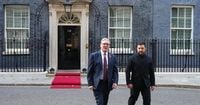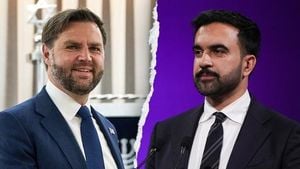On October 24, 2025, the grand halls of London played host to a high-stakes diplomatic gathering: leaders from across Europe and NATO, including UK Prime Minister Keir Starmer and Ukraine’s President Volodymyr Zelenskyy, convened for a meeting of the so-called "coalition of the willing." The timing couldn’t have been more critical. As Russian forces continued their relentless assault on Ukraine, the approaching winter loomed large, threatening to turn already dire circumstances into what President Zelenskyy described as a looming "humanitarian disaster."
According to BBC Monitoring, the meeting was marked by strong words of support for Ukraine. Prime Minister Starmer declared that the UK and its allies were "prepared to ratchet up pressure on Russia." Yet, as the day unfolded, the specifics remained frustratingly vague. Despite repeated promises to intensify efforts, the coalition leaders offered few concrete details on how they intended to alter the situation on the battlefield or force Russian President Vladimir Putin to the negotiating table. For many watching from Kyiv to Brussels, the lack of a clear plan was disappointing, if not entirely surprising.
Still, the coalition’s message was resolute: Ukraine would not be left to face the winter alone. As reported by Downing Street and highlighted in The National, the group acknowledged the urgent need to bolster Ukraine’s energy infrastructure, which has been battered by Russian strikes. "Turning to Russia's systematic targeting of critical national infrastructure, the leaders said it was extremely important to step up support to Ukraine's national grid and look at new solutions to keep the lights on in villages and towns hit by Russian strikes through the winter," a Downing Street spokesperson said.
President Zelenskyy, in a somber address, warned that Russia’s campaign was pushing Ukraine toward catastrophe. "They really want to make the winter cold a tool of torment and pressure on Ukraine," Zelenskyy said. He emphasized the need for practical, effective support from allies, adding, "Our plan is to take strong steps together." The Ukrainian leader’s words underscored the gravity of the moment: without decisive action, millions could be plunged into darkness and cold as temperatures drop.
One major hope for Kyiv was dashed overnight. Ukrainian officials had been pushing to use frozen Russian assets to reinforce their national budget, but a split within the European Union saw the prospective deal collapse. According to reports, EU leaders agreed on October 23 to meet Ukraine’s "pressing financial needs" for the next two years, but they stopped short of endorsing the asset plan. Russian President Vladimir Putin, for his part, warned that any seizure of Russian assets would prompt a "painful response," dismissing sanctions on oil companies as "unfriendly" but not significantly damaging to Russia’s economy.
Despite these setbacks, Prime Minister Starmer’s office insisted the UK was "pushing the case" for Kyiv to receive more long-range missiles and advocated for removing Russian oil and gas from the global market. "It is vital to go further to supply long-range capabilities to Ukraine," Starmer’s statement read. The UK also pointed to a recent court conviction in a Russian-linked bomb attack as evidence that "what happens in Donetsk can happen elsewhere in Europe the next day," underscoring the broader security stakes at play.
NATO Secretary General Mark Rutte, present at the London meeting, offered a cautiously optimistic assessment. "The developments on the battle show that our support to Ukraine is working and we need to keep it up," Rutte said, as quoted by The National. He highlighted that pressure on Russia, both from the frontlines and through oil market sanctions, was having an effect and needed to be sustained.
Ukraine, for its part, has not sat idle. Since August 2025, Kyiv has launched more than 60 attacks on Russian energy facilities, causing significant damage and disrupting the flow of oil and products through Russia’s sprawling pipeline system. Zelenskyy made it clear that these strikes were part of a deliberate strategy: "Kyiv was directly targeting the Russian energy system to bring the Kremlin to the negotiating table." The attacks are intended to gain leverage over Moscow by hitting one of its most vital economic lifelines.
Yet the situation is far from simple. Within the EU, divisions remain. Hungarian Prime Minister Viktor Orban, whose country depends heavily on Russian oil, openly stated on October 24 that his government was "working on ways to circumvent" US sanctions against Russian energy companies. "Anyone who wants utility price reductions must defend Hungary's right to buy oil and gas from Russia, or at the same price as the Russian or cheaper," Orban said during a radio interview. He defended Hungary’s longstanding energy price cap policy and made it clear that Budapest would keep fighting for its interests, even as the EU approved its 19th package of sanctions, which included a ban on Russian liquefied natural gas imports.
Meanwhile, the broader Western effort to starve Moscow of revenue continues. The United States, in a notable move, imposed fresh sanctions on Russia’s two largest oil producers, Rosneft and Lukoil—the first such measures since President Trump returned to office. Moscow, predictably, has promised retaliation, but insists its economy can weather the storm.
Beyond the policy wrangling and diplomatic maneuvering, there were moments of symbolism and solidarity. President Zelenskyy began his London visit by meeting King Charles III at Windsor Castle. The monarch, who has repeatedly voiced support for Ukraine, welcomed Zelenskyy just months after a tense meeting between the Ukrainian leader and US President Donald Trump. The gesture, while largely ceremonial, sent a clear message of continued British support for Ukraine’s struggle.
As the day drew to a close, the coalition’s promises hung in the air. The leaders’ statements were strong, but the absence of a concrete, game-changing plan left some observers uneasy. Ukraine’s immediate needs—especially for energy infrastructure and financial support—remain urgent. The EU’s commitment to meet Ukraine’s financial requirements for the next two years offers some reassurance, but the failure to unlock frozen Russian assets means Kyiv will have to look elsewhere for the resources it desperately needs.
In the end, the London summit underscored both the unity and the limits of Western support. The coalition of the willing remains steadfast in its backing of Ukraine, but as winter approaches and the Russian assault grinds on, the path forward is anything but clear. For now, Ukraine’s fate hangs in the balance, dependent on promises made in London and the resolve of its allies to turn words into action when it matters most.




